非谓语动词有3种形式
- 格式:doc
- 大小:56.00 KB
- 文档页数:5
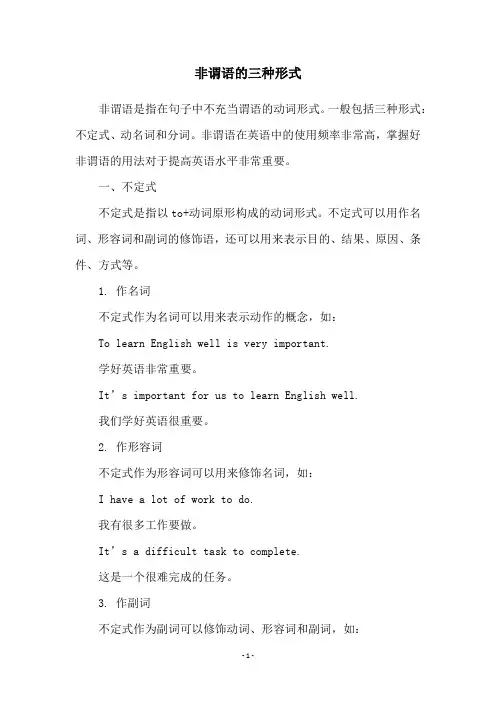
非谓语的三种形式非谓语是指在句子中不充当谓语的动词形式。
一般包括三种形式:不定式、动名词和分词。
非谓语在英语中的使用频率非常高,掌握好非谓语的用法对于提高英语水平非常重要。
一、不定式不定式是指以to+动词原形构成的动词形式。
不定式可以用作名词、形容词和副词的修饰语,还可以用来表示目的、结果、原因、条件、方式等。
1. 作名词不定式作为名词可以用来表示动作的概念,如:To learn English well is very important.学好英语非常重要。
It’s important for us to learn English well.我们学好英语很重要。
2. 作形容词不定式作为形容词可以用来修饰名词,如:I have a lot of work to do.我有很多工作要做。
It’s a difficult task to complete.这是一个很难完成的任务。
3. 作副词不定式作为副词可以修饰动词、形容词和副词,如:He works hard to support his family.他努力工作来养家。
She was too tired to continue.她太累了,不能继续了。
二、动名词动名词是指以-ing结尾的动词形式,它可以用作名词、形容词和副词的修饰语,还可以用来表示持续性动作或者正在进行的动作。
1. 作名词动名词作为名词可以用来表示一种行为或者状态,如:Swimming is my favorite sport.游泳是我最喜欢的运动。
Reading is a good way to improve your English.阅读是提高英语的好方法。
2. 作形容词动名词作为形容词可以用来修饰名词,如:I have a boring job.我有一份无聊的工作。
The exciting movie made me happy.这部令人激动的电影让我很开心。
3. 作副词动名词作为副词可以修饰动词、形容词和副词,如:She smiled, looking very happy.她微笑着,看起来很开心。
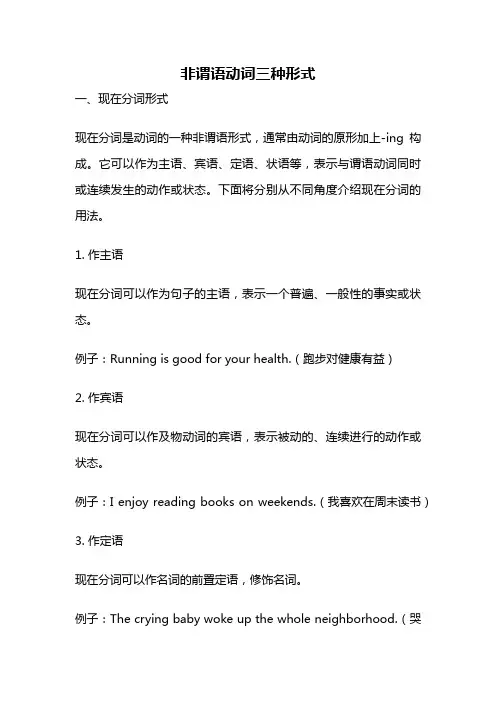
非谓语动词三种形式一、现在分词形式现在分词是动词的一种非谓语形式,通常由动词的原形加上-ing构成。
它可以作为主语、宾语、定语、状语等,表示与谓语动词同时或连续发生的动作或状态。
下面将分别从不同角度介绍现在分词的用法。
1. 作主语现在分词可以作为句子的主语,表示一个普遍、一般性的事实或状态。
例子:Running is good for your health.(跑步对健康有益)2. 作宾语现在分词可以作及物动词的宾语,表示被动的、连续进行的动作或状态。
例子:I enjoy reading books on weekends.(我喜欢在周末读书)3. 作定语现在分词可以作名词的前置定语,修饰名词。
例子:The crying baby woke up the whole neighborhood.(哭闹的婴儿把整个附近吵醒了)4. 作状语现在分词可以作状语,表示时间、原因、条件、结果等。
例子:Feeling tired, I decided to take a nap.(感到疲倦,我决定小睡一会儿)二、过去分词形式过去分词是动词的一种非谓语形式,通常由动词的原形加上-ed或不规则变化构成。
它可以作为表语、定语、状语、宾语等,表示被动、完成或状态。
下面将分别从不同角度介绍过去分词的用法。
1. 作表语过去分词可以作为系动词的表语,表示主语的特征或状态。
例子:The door was closed.(门是关着的)2. 作定语过去分词可以作名词的前置定语,修饰名词。
例子:The broken glass needs to be cleaned up.(破碎的玻璃需要清理)3. 作状语过去分词可以作状语,表示原因、条件、时间等。
例子:Having finished my homework, I went to bed early.(完成作业后,我早早就睡了)4. 作宾语过去分词可以作及物动词的宾语,表示被动或完成的动作。
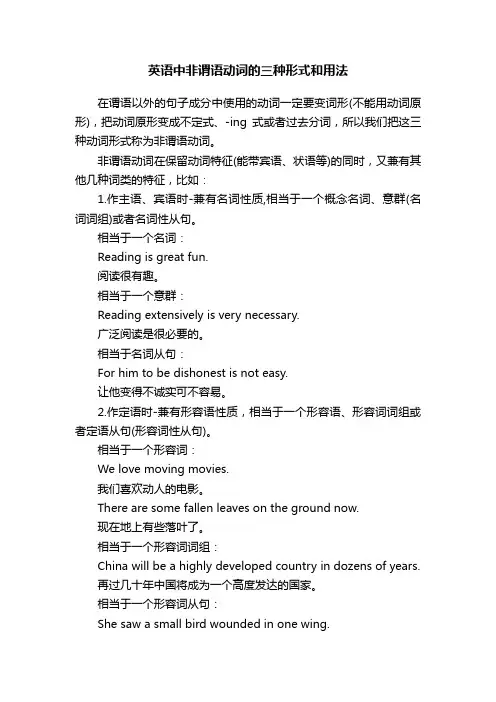
英语中非谓语动词的三种形式和用法在谓语以外的句子成分中使用的动词一定要变词形(不能用动词原形),把动词原形变成不定式、-ing式或者过去分词,所以我们把这三种动词形式称为非谓语动词。
非谓语动词在保留动词特征(能带宾语、状语等)的同时,又兼有其他几种词类的特征,比如:1.作主语、宾语时-兼有名词性质,相当于一个概念名词、意群(名词词组)或者名词性从句。
相当于一个名词:Reading is great fun.阅读很有趣。
相当于一个意群:Reading extensively is very necessary.广泛阅读是很必要的。
相当于名词从句:For him to be dishonest is not easy.让他变得不诚实可不容易。
2.作定语时-兼有形容语性质,相当于一个形容语、形容词词组或者定语从句(形容词性从句)。
相当于一个形容词:We love moving movies.我们喜欢动人的电影。
There are some fallen leaves on the ground now.现在地上有些落叶了。
相当于一个形容词词组:China will be a highly developed country in dozens of years.再过几十年中国将成为一个高度发达的国家。
相当于一个形容词从句:She saw a small bird wounded in one wing.她看见一只有个翅膀受伤的小鸟。
作状语时-兼有副词性质,相当于一个副词、副词词组或者副词从句(状语从句)。
相当于一个副词:She was happy to come.她很高兴地来了。
相当于一个副词词组:To be frank (frankly),I disagree with you.坦率地说,我不同意你的话。
相当于一个副词从句:Being late for class (=Because he was late for class), Tom was afraid to enter the classroom.由于迟到,汤姆不敢进教室。
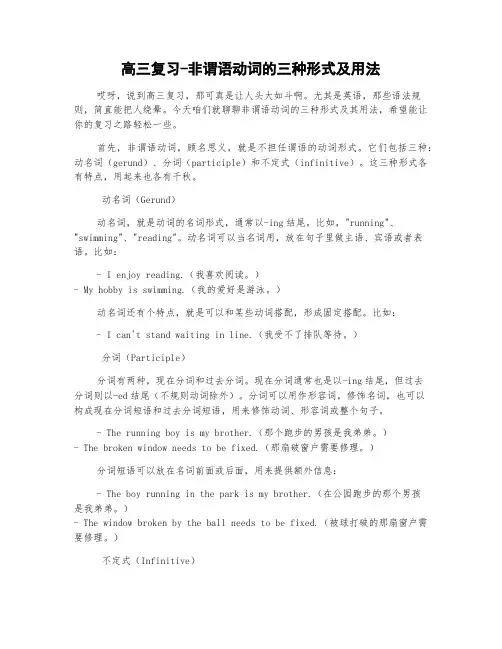
高三复习-非谓语动词的三种形式及用法哎呀,说到高三复习,那可真是让人头大如斗啊。
尤其是英语,那些语法规则,简直能把人绕晕。
今天咱们就聊聊非谓语动词的三种形式及其用法,希望能让你的复习之路轻松一些。
首先,非谓语动词,顾名思义,就是不担任谓语的动词形式。
它们包括三种:动名词(gerund)、分词(participle)和不定式(infinitive)。
这三种形式各有特点,用起来也各有千秋。
动名词(Gerund)动名词,就是动词的名词形式,通常以-ing结尾。
比如,"running"、"swimming"、"reading"。
动名词可以当名词用,放在句子里做主语、宾语或者表语。
比如:- I enjoy reading.(我喜欢阅读。
)- My hobby is swimming.(我的爱好是游泳。
)动名词还有个特点,就是可以和某些动词搭配,形成固定搭配。
比如:- I can't stand waiting in line.(我受不了排队等待。
)分词(Participle)分词有两种,现在分词和过去分词。
现在分词通常也是以-ing结尾,但过去分词则以-ed结尾(不规则动词除外)。
分词可以用作形容词,修饰名词,也可以构成现在分词短语和过去分词短语,用来修饰动词、形容词或整个句子。
- The running boy is my brother.(那个跑步的男孩是我弟弟。
)- The broken window needs to be fixed.(那扇破窗户需要修理。
)分词短语可以放在名词前面或后面,用来提供额外信息:- The boy running in the park is my brother.(在公园跑步的那个男孩是我弟弟。
)- The window broken by the ball needs to be fixed.(被球打破的那扇窗户需要修理。
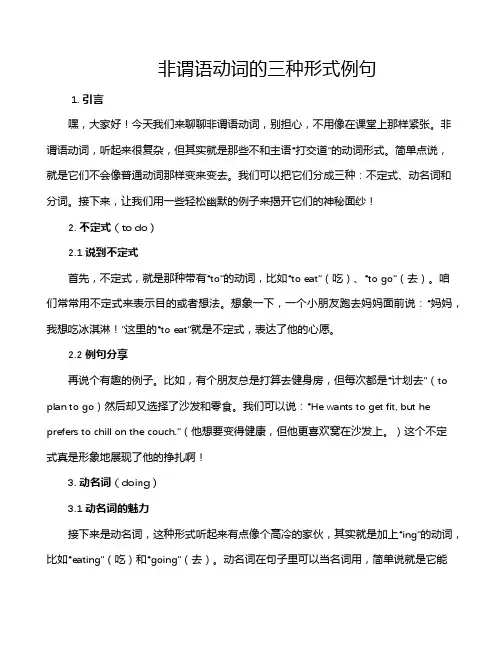
非谓语动词的三种形式例句1. 引言嘿,大家好!今天我们来聊聊非谓语动词,别担心,不用像在课堂上那样紧张。
非谓语动词,听起来很复杂,但其实就是那些不和主语“打交道”的动词形式。
简单点说,就是它们不会像普通动词那样变来变去。
我们可以把它们分成三种:不定式、动名词和分词。
接下来,让我们用一些轻松幽默的例子来揭开它们的神秘面纱!2. 不定式(to do)2.1 说到不定式首先,不定式,就是那种带有“to”的动词,比如“to eat”(吃)、“to go”(去)。
咱们常常用不定式来表示目的或者想法。
想象一下,一个小朋友跑去妈妈面前说:“妈妈,我想吃冰淇淋!”这里的“to eat”就是不定式,表达了他的心愿。
2.2 例句分享再说个有趣的例子。
比如,有个朋友总是打算去健身房,但每次都是“计划去”(to plan to go)然后却又选择了沙发和零食。
我们可以说:“He wants to get fit, but he prefers to chill on the couch.”(他想要变得健康,但他更喜欢窝在沙发上。
)这个不定式真是形象地展现了他的挣扎啊!3. 动名词(doing)3.1 动名词的魅力接下来是动名词,这种形式听起来有点像个高冷的家伙,其实就是加上“ing”的动词,比如“eating”(吃)和“going”(去)。
动名词在句子里可以当名词用,简单说就是它能出现在主语或宾语的位置上。
想象一下,一个人正在享受美食,你可以说:“Eating ice cream makes me happy.”(吃冰淇淋让我快乐。
)。
3.2 有趣的场景再来个生活中的例子吧。
想象一下你和朋友在讨论周末的计划,你说:“I love hiking on we ekends!”(我喜欢周末去爬山!)这就是用动名词表达你对活动的喜爱。
可当你的朋友说:“I prefer bingewatching shows all day.”(我更喜欢一整天追剧。
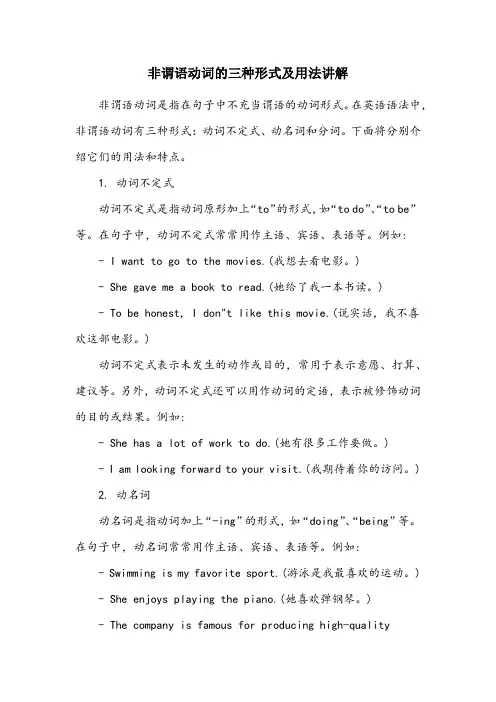
非谓语动词的三种形式及用法讲解非谓语动词是指在句子中不充当谓语的动词形式。
在英语语法中,非谓语动词有三种形式:动词不定式、动名词和分词。
下面将分别介绍它们的用法和特点。
1. 动词不定式动词不定式是指动词原形加上“to”的形式,如“to do”、“to be”等。
在句子中,动词不定式常常用作主语、宾语、表语等。
例如:- I want to go to the movies.(我想去看电影。
)- She gave me a book to read.(她给了我一本书读。
)- To be honest, I don"t like this movie.(说实话,我不喜欢这部电影。
)动词不定式表示未发生的动作或目的,常用于表示意愿、打算、建议等。
另外,动词不定式还可以用作动词的定语,表示被修饰动词的目的或结果。
例如:- She has a lot of work to do.(她有很多工作要做。
)- I am looking forward to your visit.(我期待着你的访问。
)2. 动名词动名词是指动词加上“-ing”的形式,如“doing”、“being”等。
在句子中,动名词常常用作主语、宾语、表语等。
例如:- Swimming is my favorite sport.(游泳是我最喜欢的运动。
) - She enjoys playing the piano.(她喜欢弹钢琴。
)- The company is famous for producing high-qualityproducts.(这家公司以生产高质量的产品而闻名。
)动名词表示正在进行的动作或状态,常用于表示爱好、兴趣、能力等。
另外,动名词还可以用作动词的定语,表示被修饰动词的方式或伴随状况。
例如:- I am feeling very tired.(我感觉很累。
)- She was excited about learning a new language.(她对学习一门新语言感到兴奋。
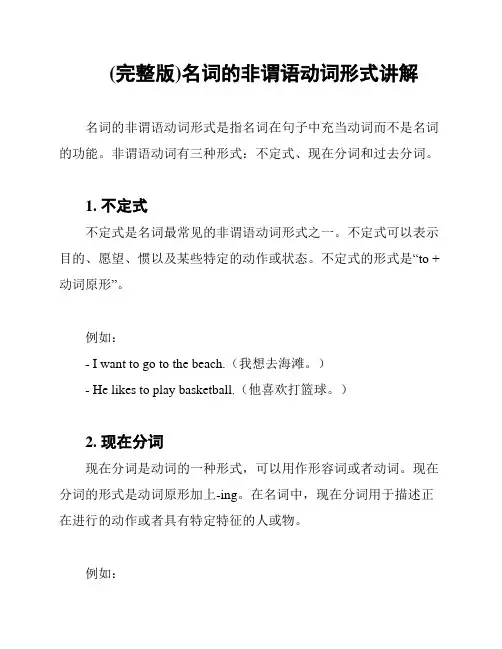
(完整版)名词的非谓语动词形式讲解名词的非谓语动词形式是指名词在句子中充当动词而不是名词的功能。
非谓语动词有三种形式:不定式、现在分词和过去分词。
1. 不定式不定式是名词最常见的非谓语动词形式之一。
不定式可以表示目的、愿望、惯以及某些特定的动作或状态。
不定式的形式是“to + 动词原形”。
例如:- I want to go to the beach.(我想去海滩。
)- He likes to play basketball.(他喜欢打篮球。
)2. 现在分词现在分词是动词的一种形式,可以用作形容词或者动词。
现在分词的形式是动词原形加上-ing。
在名词中,现在分词用于描述正在进行的动作或者具有特定特征的人或物。
例如:- The running man is my brother.(那个跑步的人是我哥哥。
)- The interesting book is on the table.(有趣的书在桌子上。
)3. 过去分词过去分词是动词的一种形式,常用作形容词,表示完成的动作或状态。
过去分词的形式有规律变化和不规则变化。
在名词中,过去分词也用于描述或修饰人或物。
例如:- The broken vase was expensive.(那个破损的花瓶很贵。
)- She is interested in the written article.(她对那篇书面文章很感兴趣。
)综上所述,名词的非谓语动词形式主要包括不定式、现在分词和过去分词。
掌握这些形式的用法和规则可以帮助我们更准确地表达自己的意思,并丰富我们的语言表达能力。
*注意:以上内容仅供参考,具体语法使用请根据具体语境和句子结构进行判断和运用。
*。
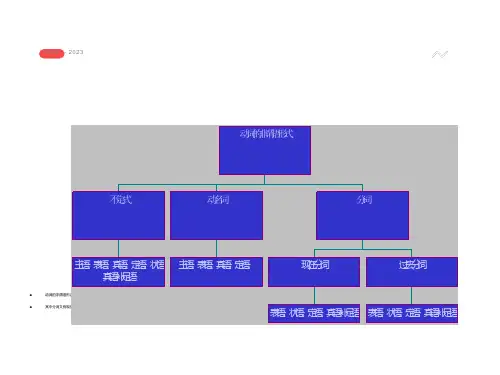

三大非谓语动词的语法作用非谓语动词主要包括不定式、动名词和分词(现在分词和过去分词)三种形式。
以下是三大非谓语动词的语法作用:1. 不定式:不定式在句子中可以作为主语、宾语、表语、定语和状语。
作主语:To see is to believe(眼见为实)。
作宾语:I want to go home(我想回家)。
作表语:My dream is to become a teacher(我的梦想是成为一名老师)。
作定语:I have a lot of homework to do(我有很多作业要做)。
作状语:I came here to see you(我来这里看你)。
2. 动名词:动名词在句子中可以作为主语、宾语和表语。
作主语:Reading books is a good habit(读书是一个好习惯)。
作宾语:I enjoy listening to music(我喜欢听音乐)。
作表语:My hobby is playing basketball(我的爱好是打篮球)。
3. 分词:分词在句子中可以作为定语、表语、状语和补足语。
作定语:The excited children were running around the playground (兴奋的孩子们在操场上跑来跑去)。
作表语:I feel bored(我觉得无聊)。
作状语:He went to the library, following his teacher(他跟着老师去了图书馆)。
作补足语:We found the missing child crying in the woods(我们找到了在树林里哭的失踪孩子)。
总的来说,非谓语动词在句子中有着重要的语法作用,可以使句子结构更加丰富,表达更加多样。
如需了解更多关于非谓语动词的信息,建议查阅英语语法书籍或咨询英语教师。

什么是非谓语动词在英语语法中,非谓语动词是一类特殊的动词形式,它不具备谓语动词的一些特征,如时态和人称的变化。
非谓语动词包括动词的不定式(infinitive)、动名词(gerund)和分词(participle)。
非谓语动词在句子中可以作为名词、形容词或副词的成分。
1. 不定式(infinitive)不定式是非谓语动词中最常见的形式之一。
它通常由动词的词根形式加上to构成,例如to go、to eat、to learn等。
不定式可以用作名词、形容词或副词。
作为名词时,不定式可以做主语、宾语、表语等。
例如:- To travel is my dream.(去旅行是我的梦想。
)- He wants to buy a new car.(他想买一辆新车。
)作为形容词时,不定式可以修饰名词,并用来表达目的、原因、结果等。
例如:- He needs a book to study.(他需要一本书来学习。
)- I am happy to see you.(我很高兴见到你。
)作为副词时,不定式用来修饰动词、形容词或副词,表示目的、结果、方式等。
例如:- She works hard to succeed.(她努力工作以获得成功。
)- He walked slowly to avoid falling.(他慢慢地走以避免摔倒。
)2. 动名词(gerund)动名词是动词的-ing形式,它可以作为一个名词在句子中使用。
与不定式不同,动名词可以作为主语、宾语、表语、介词宾语等。
例如:- Swimming is good exercise.(游泳是一项好的锻炼。
)- I enjoy singing.(我喜欢唱歌。
)动名词也可以与一些特定的动词或动词短语搭配使用,这些短语通常以动名词作为宾语。
例如:- He admitted stealing the money.(他承认偷了钱。
)- She can't help laughing.(她禁不住笑。
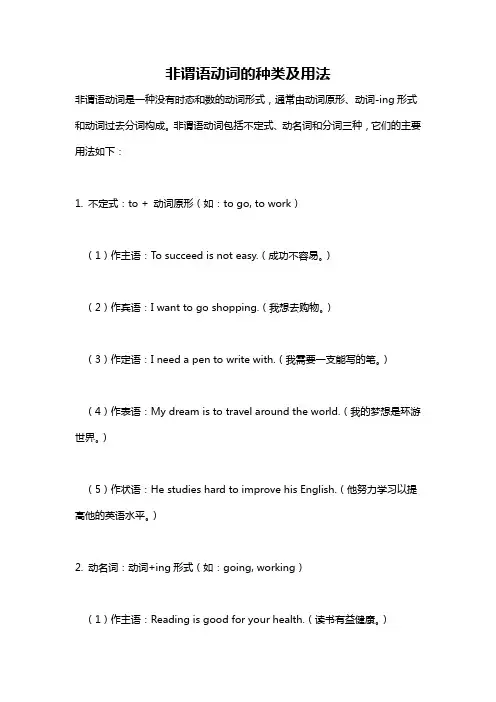
非谓语动词的种类及用法非谓语动词是一种没有时态和数的动词形式,通常由动词原形、动词-ing形式和动词过去分词构成。
非谓语动词包括不定式、动名词和分词三种,它们的主要用法如下:1. 不定式:to + 动词原形(如:to go, to work)(1)作主语:To succeed is not easy.(成功不容易。
)(2)作宾语:I want to go shopping.(我想去购物。
)(3)作定语:I need a pen to write with.(我需要一支能写的笔。
)(4)作表语:My dream is to travel around the world.(我的梦想是环游世界。
)(5)作状语:He studies hard to improve his English.(他努力学习以提高他的英语水平。
)2. 动名词:动词+ing形式(如:going, working)(1)作主语:Reading is good for your health.(读书有益健康。
)(2)作宾语:I enjoy dancing.(我喜欢跳舞。
)(3)作定语:The running water is very clear.(流水很清澈。
)(4)作表语:Her favorite hobby is swimming.(她最喜欢的爱好是游泳。
)(5)作状语:He walked home, singing all the way.(他一路唱着歌走回家。
)3. 分词:动词的-ing形式或过去分词形式(如:going, worked)(1)现在分词作状语:Smiling, she walked towards me.(微笑着,她朝我走来。
)(2)过去分词作状语:Having finished his homework, he went to bed.(完成了家庭作业,他上床休息了。
)(3)现在分词作定语:The running water is very clear.(流水很清澈。
非谓语形式不受主语的限制,因此又被称为动词的非限定形式(Non-finite Forms of Verbs)。
确切地讲,非谓语动词实际上指动词的非谓语形式。
动词的非谓语形式有三种:
1.不定式(The Infinitive),由to +动词原形构成,to 为不定式符号,并无实际意义。
2.动名词(The Gerund),由动词+ing构成。
3.分词(The Participle)
1)现在分词(The Present Participle),由动词+ing构成
2)过去分词(The Past Participle),由动词+ed构成。
非谓语动词具有以下特征:
非谓语动词可以做主语、宾语等多种句子成分,但唯独不能做谓语。
非谓语动词具有各种形态:原形、主动语态、被动语态、进行时态和完成时态。
非谓语动词具有动词的功能,如可以有自己的宾语,但不具有语法上的动词性质,如没有人称和数的变化。
例:Growing flowers is my hobby.
Thank you for helping us.
I hope to see you again.
使用非谓语动词的条件:
在一个句子中,已经存在一个谓语动词,而又没有连词的情况下,其他的动词就需要使用非谓语形式。
She got off the bus, __leaving_____(leave)her handbag on her seat.
She got off the bus, but __left___ (leave) her handbag on her seat.。
非谓语动词的三种形式与用法非谓语动词是指在句子中充当其他成分而不担任谓语的动词形式。
一般来说,非谓语动词有三种形式:不定式、动名词和分词。
它们在句子中有着不同的用法和功能。
下面将详细介绍这三种非谓语动词的形式与用法。
一、不定式不定式是动词的一种形式,它可以作为名词、形容词或副词的补语,也可以作为谓语的补语。
不定式一般由“to + 动词原形”构成。
1. 作为名词的补语不定式可以作为名词的补语,起到与名词相同的作用。
例如:- My dream is to travel around the world.(我的梦想是环游世界。
)- I have a lot of work to do.(我有很多事情要做。
)2. 作为形容词的补语不定式可以作为形容词的补语,修饰名词或代词。
例如:- She has a book to read.(她有一本要读的书。
)- I am happy to see you.(见到你我很高兴。
)3. 作为副词的补语不定式可以作为副词的补语,修饰动词、形容词或副词。
例如:- He ran fast to catch the bus.(他快速地跑去赶公交车。
)- I woke up early to prepare for the exam.(我早早醒来准备考试。
)二、动名词动名词是一种以-ing 结尾的动词形式,它可以作为名词的主语、宾语、定语、表语等。
1. 作为名词的主语动名词可以作为句子的主语,表示某种行为或概念。
例如:- Swimming is good exercise.(游泳是一项好的锻炼。
)- Reading books is my favorite hobby.(阅读书籍是我最喜欢的爱好。
)2. 作为名词的宾语动名词可以作为某些动词的宾语,表示被动或完成的动作。
例如:- I enjoy swimming in the sea.(我喜欢在海里游泳。
)- She hates doing household chores.(她讨厌做家务活。
非谓语动词的形式和语态非谓语动词在英语语法中占据着重要的地位。
它不仅可以作为动词的形式,还可以在句子中充当不同的语态。
本文将探讨非谓语动词的形式和语态,并举例说明它们在句子中的应用。
一、非谓语动词的形式非谓语动词有三种形式:不定式、动名词和现在分词/过去分词。
它们的形式和用法各不相同,下面将分别进行介绍。
1. 不定式不定式由"to"加上动词原形构成,例如:to go、to eat。
它有时可以带有助动词"to be",形成被动语态的不定式,例如:to be eaten。
不定式主要用于以下几个方面:- 表示目的或目标:I went to the store to buy some groceries.- 作为动宾结构的宾语:She wants to learn to play the piano.- 用于形容词后面修饰名词:She is the person to ask for help.2. 动名词动名词是动词加上-ing形式构成,例如:going、eating。
它可以作为主语、宾语、表语、介词宾语等。
动名词主要用于以下几个方面:- 作为主语:Swimming is my favorite hobby.- 作为宾语:I enjoy playing basketball.- 作为表语:Her favorite activity is dancing.3. 现在分词/过去分词现在分词由动词原形加上-ing构成,过去分词则根据动词的不同形式而变化,例如:going、eaten。
它们可以作为形容词修饰名词。
现在分词和过去分词主要用于以下几个方面:- 作为非限定性定语:The dog, barking loudly, scared the mailman.- 作为限定性定语:I saw a broken glass on the floor.- 作为表语:The situation seems confusing.二、非谓语动词的语态非谓语动词在句子中可以具有主动语态或被动语态。
非谓语动词的三种形式及用法总结非谓语动词是汉语中非常常用的一种语法成分。
非谓语动词不仅仅是汉语中的一种动词,它也可以用来表达一种动态的概念,也可以作为一种语法结构。
根据不同的用法,可以将非谓语动词分为三种形式:不定式,动名词和分词。
本文将介绍非谓语动词的三种形式,以及它们的用法。
首先,不定式是最常用的非谓语动词形式,它在句子中作为宾语、状语或补语使用,一般以动词原形开头,跟着助动词“to”。
不定式有两种:完成不定式和未完成不定式。
完成不定式表示动作已经完成,未完成不定式表示动作还未发生。
例如:I want to go to the store (我想去商店),I have already gone to the store (我已经去过商店)。
其次,动名词是完成形式的一种,它表示一个动作的进行或完成的状态,一般以动词的原形开头,跟着助动词“to”。
动名词也可以用作宾语、定语、状语或补语等。
例如:I like watching movies (我喜欢看电影),She doesn like going shopping (她不喜欢购物)。
最后,分词是变位语法的一种,它是一种过去分词或现在分词,分词用来修饰句子中的名词或代词。
分词表示一个被动的动作或过去某一时间发生的动作,按照时态可以分为过去分词和现在分词。
例如:I saw him running (我看见他在跑步),He said he was leaving (他说他正要离开)。
总的来说,非谓语动词是汉语中最常用的一种语法成分,它们在句子中可以用作宾语、状语、补语或定语等,它们的作用是使句子的意义更加完整明确,更加准确地表达说话者的意思。
以上就是有关非谓语动词的三种形式及用法总结,希望能够帮助你更好地使用非谓语动词。
非谓语动词的种类【非谓语动词的种类】非谓语动词指的是不具有时态和人称变化的动词形式,包括不定式、动名词和分词。
它们在句子中可以作主语、宾语、表语、定语或状语等成分,具有丰富的用法和功能。
本文将详细介绍非谓语动词的种类及其用法。
一、不定式(Infinitive)不定式由“to + 动词原形”构成,不受主语和时态的限制。
不定式可以用作谓语动词、宾语、定语、表语、补语等。
1. 作为谓语动词:- To study is important for students.- My dream is to become a doctor.在以上句子中,不定式作为谓语动词,直接说明了主语的动作或状态。
2. 作为宾语:- She wants to learn French.- They decided to go on a trip.在以上句子中,不定式作为宾语,说明了动作的目的或意图。
3. 作为定语:- The best way to learn a language is to practice speaking.- I have some books to read.在以上句子中,不定式作为定语修饰名词,起到修饰或限定的作用。
4. 作为表语:- His hobby is to play the guitar.- Our goal is to win the championship.在以上句子中,不定式作为表语,说明主语的特点或状态。
5. 作为补语:- I want to go shopping.- They need to finish their homework.在以上句子中,不定式作为补语,表示一种需要或必要。
二、动名词(Gerund)动名词由动词的现在分词形式(加-ing)构成,具有名词和动词的特点,用法灵活多样。
1. 作为主语:- Swimming is good exercise.- Eating too much is unhealthy.在以上句子中,动名词作为主语,起到名词的作用。
非谓语动词用法顺口溜
非谓语动词的用法顺口溜如下:
前:感官动词和be动词
后:doing、done、to do
区别: doing(主动)to do(主动)done(被动)
解释:在句子中,非谓语动词的位置通常在主语和谓语动词之间。
非谓语动词有三种形式:动词不定式(to do)、动词的-ing形式和动词的-ed形式。
其中,动词不定式通常表示将要进行的动作,动词的-ing形式表示正在进行的动作,而动词的-ed形式则表示已经完成的动作。
这个顺口溜可以帮助你快速记住非谓语动词的基本用法,但要真正掌握非谓语动词的用法,还需要多练习和运用。
非谓语动词有3种形式:不定式、动名词和分词(一)不定式具有名词、形容词和副词的性质。
动词不定式由“to + 动词原形”构成,其否定形式是“not to do”,不定式可以带宾语或状语构成不定式短语,没有人称和数的变化,但有时态和语态的变化。
不定式可做主语、宾语、状语、标语和定语,但不能单独做谓语。
不定式的逻辑主语有时用“for/of +名词或代词宾格”构成。
一作主语。
不定式做主语时,往往放在谓语之后,用it做形式主语。
1. To see is to believe.2. It‟s difficult (for us) to learn English.3. It‟s foolish of her to believe him.= She is foolish to believe him.二作表语1. His aim is to win the first prize.2. All we can do is (to) wait.One‟s dream / aim / ambition / wish / The first step / What I want to do is to…三作宾语1. He demanded to be told the truth.2. He pretended to be doing his homework / to have fallen asleep when Mother came in.(decide / fail / manage / refuse / pretend / choose / agree / hope/ plan / promise / make up one‟s mind + to do)3. I don‟t know what to do.(decide / find out / know / learn / consider etc + 疑问词+ to do)4. Anyone can become a better scholar if he wants to.5. ---Are you on holiday? ---No, but I‟d like to be.四作宾补或主补1. I‟ll have him say something at the meeting.have sb do = get sb to dofeel; hear / listen to; let / have / make; see / watch / look at / notice / observe sb do但被动语态要+ to, let 例外Listen to me read the text.He is often listened to sing the song.He was let go by the police.2. He ordered his men to fire.wish / advise / persuade / allow / permit / want / tell / ask / expect / order / require / request sbto dosuggest / hope / agree / demand / arrange sb to do3. He is said to be doing the work of next year.It‟s said that he is doing the work of next year.sb + seem / appear / happen / be said / be reported / be known /be found / be believed + to do / to be doing / to have ( been) doneIt + seem / appear / happen / be said … / be believe that….六作定语1. I have a lot of work to do / no pen to write with.2. the first to come / to be awarded the Nobel Prize3. the last person to do such a thing 最不愿意做…的人4. the house to be built next year比较: the house being built now / build last year注意(1)做定语的不定式如果是不及物动词,或者不定式所修饰的名词或代词是不定式动作的地点、工具等,不定式后应有相应的介词。
例如:He is looking for a room to live in.She has no knife to cut with.但是,不定式修饰的名词如果是time、place或way,不定式后面的介词习惯上要省去。
例如:He has no money and no place to live.注意(2)做定语的不定式所修饰的名词或代词是不定式或动作的承受者时,不定式可以用主动语态,也可以用被动语态,但含义有所不同。
比较:A)Have you anything to send?你有东西要寄吗?(不定式to send的动作执行者是you)B)Have you anything to be sent?你有什么(要我或别人)寄的东西吗?(to be sent 的动作执行者是被省略的me或someone else)七作状语(表示目的、原因、结果或条件)目的to / in order to / so as to结果enough to / too…to / so…as to / such…as to / only to1. The bus stopped to pick up passengers. (目的)2. He set out early in order to / so as to catch the first bus.= In order to / To catch the first bus he set out early.3. I‟m sorry to have kept you waiting.(原因)4. I hurried to school only to be told it was a holiday. (结果)only to do sth 表示出于预料之外的结果5. To look at him, you would like him.(条件)不定式的否定形式She kept silent about the accident so as not to lose his job.不定式的完成和被动式The book seems to have been translated into English.但是: The book is difficult to understand.I have a letter to write / a lot of work to do.He is to blame for the accident.Ⅱ动名词具有名词的性质一作主语1. Seeing is believing. = To see is to believe.2. It‟s no use / no good / useless doing sth. It‟s no use crying over spilt milk.3. Being forced to leave the classroom made him feel embarrassed.二作表语1. My job is teaching English.比较: One‟s dream / aim / ambition / The first step is to do sth.动名词作表语, 可与主语交换位置, 句子成立; 现在分词则不能。
三作宾语(动宾/ 介宾/ it 作形式宾语)1. I appreciate hearing from you again.2. He doesn‟t feel like eating anything.四作定语1. a writing desk2. a swimming pool 动名词作定语表示被修饰名词的用途比较: a sleeping boy = a boy who is sleeping 现在分词作定语表示被修饰名词的动作Ⅲ现在分词和过去分词具有形容词和副词的性质一作表语The news is exciting. We are excited.二作宾补或主补感官动词和实意动词see / hear / watch / look at / notice / feelMake/have/leave/get四作定语1.falling leaves / fallen leaves2.a friend living in London3.the book written by Lu Xun 五作状语1. Be careful while crossing the street.Having been shown the lab, they were taken to see the library.Hearing the news, they jumped with joy. (时间)2. Being repaired, the swimming pool doesn‟t open today.Not having received her letter, she wrote another.Encouraged by his teacher, he decided to follow a music career. (原因)3. Given enough time, we could do it much better.Turning left, you will find the shop. (条件)4. They stood there waiting for a bus.The old man went out of the hospital, supported by his son.We walked as fast as we could, hoping to catch the first bus.(伴随)5. The new machine works twice as fast, thus greatly reducing cost.His parents died, leaving him an orphan.分词表示自然的结果;不定式则表示预料之外的结果6. Though / Even if invited, he will not come (让步)※独立主格结构分词作状语时, 其逻辑主语必须与句子的主语一致, 否则必须有自己独立的逻辑主语Seen from the top of the building, the city looked very charming.Time permitting, we‟ll have a discussion.独立主格结构由名词/代词+分词/形容词/副词等构成,在句中作原因、条件、时间和伴随状语1. There being no bus, we had to walk home.2. Weather permitting, we will have a picnic.with 结构1. with + n + doingwith so many patients waiting outside a boy2. with + n + donewith his eyes fixed on the blackboard3. with + n + to dowith so much work to do非谓语动词专项练习1. ___ anything about the accident, he went to work as usual.A . Don‟t k now B. not to know C. not knowing D. not to be knowing2. the next morning she found the man __in bed, dead.A. lyingB. lieC. layD. laying3. he had his leg __in the match yesterday.A .to break B. broken C. break D. breaking4. most of the people __ to the party were famous scientists.A. invitedB. to inviteC. being invitedD. inviting5. Do you know the boy ___under the tree?A. layB. lainC. layingD. lying6. ---Good morning. Can I help you?-----I…d like to have this package ___A. be weighedB. to be weighedC. to weighD. weighed8._____more attention, the trees could have grown better.A. givenB. to giveC. givingD. having given9. the murderer was brought in, with his hand ___behind his back..A. being tiedB. having tiedC. to be tiedD. tied10. the secretary worked late into the night ,___a long speech for the president.A. to prepareB. preparingC. preparedD. was preparing11. she‟s upstairs ____ a letter.A. writesB. is writingC. writeD. writing12. it was so cold that they kept the fire ___all night.A. to burnB. burnC. burningD. burned13.the speaker raised his voice but still couldn‟t make himself ___A. hearB. to hearC. hearingD. heard14. _______ a reply, he decided to write again.A. not receivingB. receiving notC. not having receivedD. having not received15.the salesman scolded the girl caught ___ and let her off.A. to have stolenB. to be stealingC. to stealD. stealing16. “can‟t you read ?” she said ____to the notice.A. angrily pointingB. and point angrilyC. angrily pointedD. and angrily pointing17.the missing boys were seen ____near the river.A. playingB. to be playingC. playD.to play18._______to top of the hill, and you can see the whole of the town.A. GetB. To getC. GettingD. Having got CA B A D DAADBDCDCD A AA。